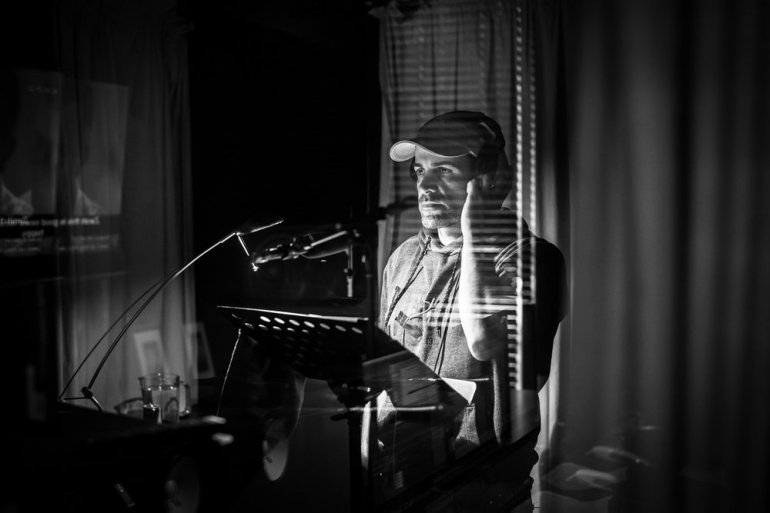Robert Rabiah (Photo credit: Glendyn Ivin).
When Robert Rabiah scored his first major role in Andrew Dominik’s Chopper in 2000, he felt he had arrived as an actor.
Yet he soon discovered acting is a fickle profession, as he experienced some lean periods in between roles in Michael Rymer’s Face to Face and in TV series including Stingers, Unberbelly, Fat Tony & Co and Deadline Gallipoli.
A lot of hard work and perseverance paid off for Rabiah when he secured key roles in Jeffrey Walker’s Ali’s Wedding and in Matchbox Pictures’ four-part drama Safe Harbour for SBS.
“It’s been a great year,” he tells IF. “You never stop learning and I am still growing as an artist. Every role is a big role to me. I always pour my heart and soul into every part and every script.
“My hope is that Safe Harbour will enjoy the success that Ali’s Wedding has received and I have no doubt it will. There was such a great vibe on both sets, a lot of love went into making both productions and my feeling is that will translate to an audience. “
Directed by Glendyn Ivin and scripted by Belinda Chayko, Matt Cameron and Phil Enchelmaier, Safe Harbour follows five Aussies as they encounter a broken-down fishing boat full of desperate asylum seekers.
They agree to tow the stricken vessel back to Australia but the next morning it has vanished. Five years later they meet some of the refugees and discover someone had cut the rope, resulting in the loss of seven lives.
Nicole Chamoun and Hazem Shammas play Zahra and Ismail, an Iraqi couple whose nine-year-old daughter dies after the vessel sinks, and Rabiah is Ismail’s brother Bilal.
The actor describes his character as a strong and warm but vulnerable man with a harrowing past who is determined to keep his family together at any cost. His undiagnosed PTSD makes him an outsider, even to his family at times.
To prepare for the physically demanding role he lost 10kg and did boxing and commando-style workouts at 3.30 each morning before the 6am call.
“I felt the weight of the responsibility and I went all out,” he said. “To be frank, it was a small price to pay to do justice to the asylum seekers searching for a better life, and the servicemen and women who suffer in silence from their harrowing war experiences. We come from a place of opportunity where we can be whatever we want to be – we are told that on a daily basis. A lot of people don’t have those opportunities.”

To stay in character he tried to remain apart from fellow cast members including Phoebe Tonkin, Jacqueline McKenzie, Ewen Leslie, and Leeanna Walsman. Everyone was generous and respectful of each other’s process, he says.
Chayko is one of his favourite writers and he jumped at the chance to work with Ivin, whom he admires as a vivid storyteller, and producer Stephen Corvini.
In Chopper he played Nick, right-hand man to Neville Bartos (Vince Colosimo), an amalgamation of a few real life characters with whom the real Mark Chopper Read associated.
Rymer cast him as Hakim, a disgruntled worker who is the subject of bullying and racial vilification in the workplace, in the 2011 drama Face to Face.
In Deadline Gallipoli he played Mehmet, the only Turkish soldier who could speak English and after being captured served as a translator for journalist Charles Bean (Joel Jackson, who is part of the ensemble cast of Safe Harbour). Before filming started Sam Worthington sent him an email to stress he was determined to tell both sides of the WWI story.
Rabiah studied acting at the Beverly Hills Playhouse in Los Angeles in 1997-1998, living in a mate’s walk-in wardrobe, and he has written several screenplays, shorts and documentaries.
Jericho, the screenplay he co-wrote with Evan Clarry, won the Australian Writers’ Guild’s Monte Miller Award in 2006, which he says gave him a better understanding of story and character.
In Ali’s Wedding he played Mohsen, the father of Dianne (Helana Sawires).
The actor concludes: “I am also very optimistic about where the Australian film and television industry is headed. SBS and diversity have been synonymous for as long as I can remember. Now everyone else is slowly catching up.
“There is a real market for stories with a diverse tapestry of colour, race, gender, class. We need more of them, both here and abroad. The tide is slowly turning and we are seeing what is reflected on our streets finally reflected on our screens.”


